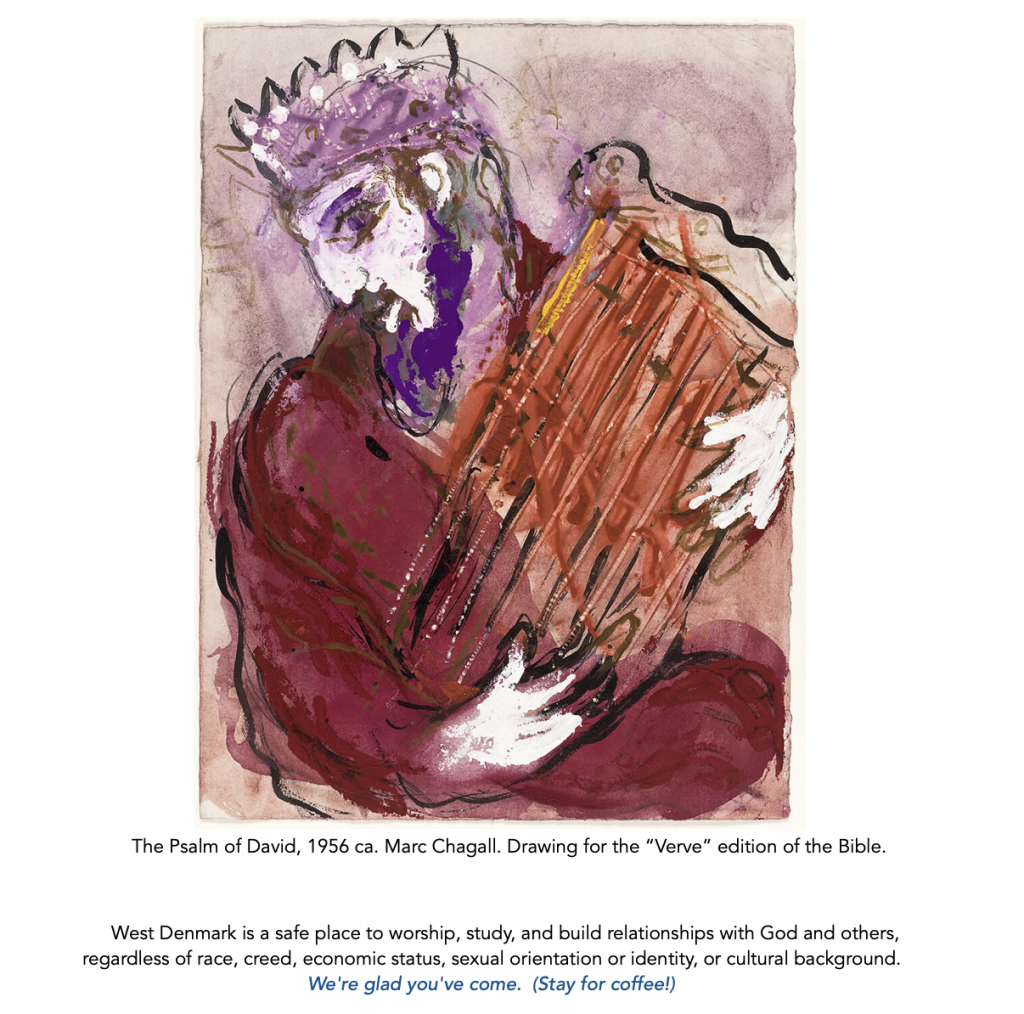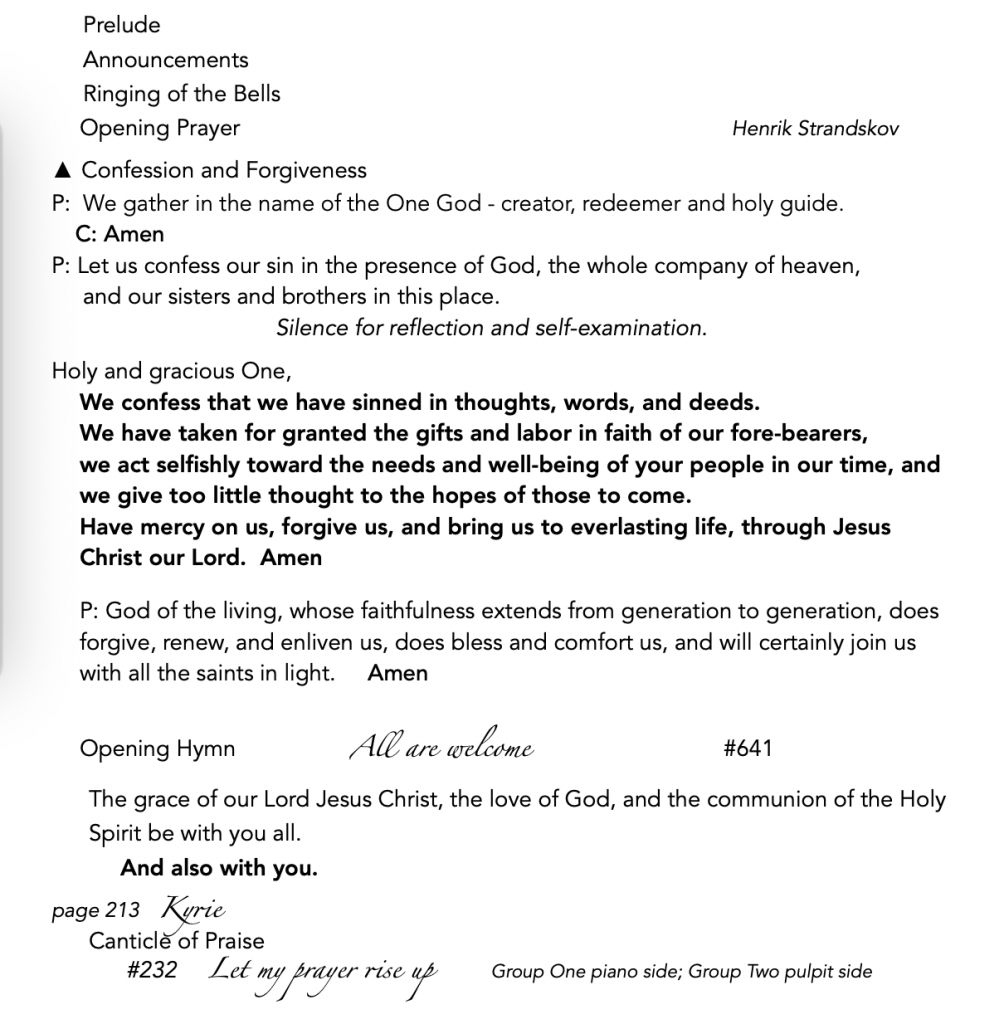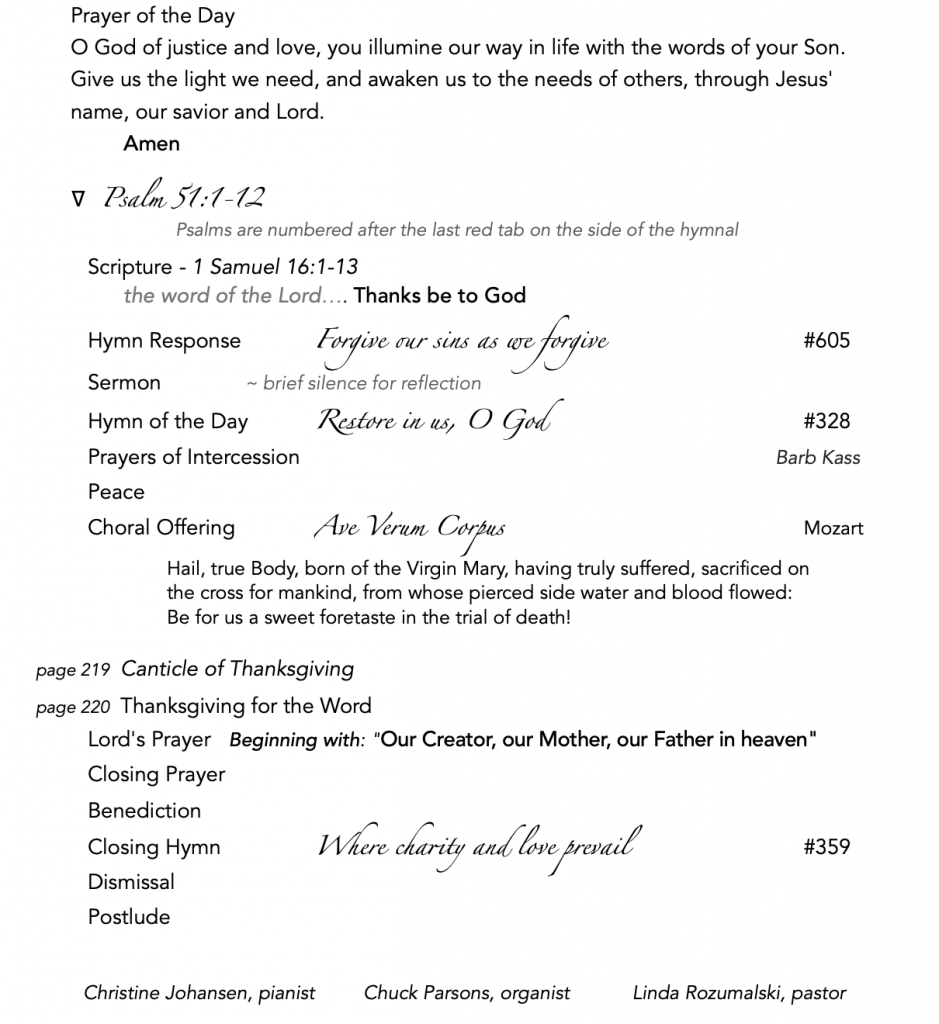


Last week we read of Moses and God’s instruction for how to occupy the Promised Land. This week we have moved ahead 300 to 400 years to David. Between them lies the period of Judges in which Israel was ruled or lead by military leaders like Joshua, Gideon, Samson and Deborah. After an incomplete conquest that left much of the land in the hands of their foes (the original occupants), Israel follows a recurring pattern of disloyalty to God’s instruction followed by oppression from their enemies, cries of repentance, and God sending deliverers in the form of these national or regional military leaders. In the end of the period, Israel descends into idolatry, bloodshed and a disastrous civil war.
God delivered the people from slavery out of the hand of Egypt, leading them through the wilderness to freedom. The point of the Exodus was that they would never again need to serve another pharaoh: God would be their king – benevolent, seeing, listening, guiding. However, Israel steadfastly wanted (and seems to need) an earthly king, a human king to stand up against the military kings of their neighbors and enemies, a king to rule over them and give them boundaries and save them from the Philistines.
The prophet Samuel was instructed by God to anoint Saul as their first king. And when Saul strayed from God’s way, Samuel was sent to Bethlehem, to the house of Jesse.
1 Samuel, the 16th chapter:
1 The Lord said to Samuel, “How long will you grieve over Saul? I have rejected him from being king over Israel. Fill your horn with oil and set out; I will send you to Jesse the Bethlehemite, for I have provided for myself a king among his sons. …Take a heifer with you, and say, “I have come to sacrifice to the Lord.’ 3 Invite Jesse to the sacrifice, and I will show you what you shall do; and you shall anoint for me the one whom I name to you.”
4 Samuel did what the Lord commanded, and came to Bethlehem. The elders of the city came to meet him trembling, and said, “Do you come peaceably?” 5 He said, “Peaceably; I have come to sacrifice to the Lord; sanctify yourselves and come with me to the sacrifice.” And he sanctified Jesse and his sons and invited them to the sacrifice.
6 When they came, he looked on Eliab and thought, “Surely the Lord’s anointed is now before the Lord.” 7 But the Lord said to Samuel, “Do not look on his appearance or on the height of his stature, because I have rejected him; for the Lord does not see as mortals see; they look on the outward appearance, but the Lord looks on the heart.”
8 Then Jesse called Abina-dab, and made him pass before Samuel. He said, “Neither has the Lord chosen this one.” 9 Then Jesse made Shammah pass by. And he said, “Neither has the Lord chosen this one.” 10 Jesse made seven of his sons pass before Samuel, and Samuel said to Jesse, “The Lord has not chosen any of these.”
11 … “Are all your sons here?” And he said, “There remains yet the youngest, but he is keeping the sheep.” And Samuel said to Jesse, “Send and bring him; for we will not sit down until he comes here.”
12 He sent and brought him in. Now he was ruddy, and had beautiful eyes, and was handsome. The Lord said, “Rise and anoint him; for this is the one.” 13 Then Samuel took the horn of oil, and anointed him in the presence of his older brothers; and the spirit of the Lord came mightily upon David from that day forward.
Much later in the Bible, Isaiah promises that the Messiah will come from the stump of Jesse, from the house and lineage of David – this Jesse, this David, and here, God tells Samuel, “Rise and anoint him; for this is the one.” If I could read this to you in Hebrew or Greek, there’s a word that would sound very familiar, and probably quite out of place: it’s the word anoint, the anointed one. In Hebrew it is meshiak, messiah; in Greek it is christos, the christened one, the christ.
It still kind of surprises me to come upon these other christs in the Bible, when I am expecting there to be only one. There are several of them, however, because it is a descriptive word, not a title. Christ is not Jesus’ last name – he is ‘Jesus, the Christ’, the anointed one of God. A christ is what the people wanted and what God repeatedly tries to provide. But the kings of Israel never live up to God’s plan for them. The kings of Israel, the messiahs, the christened, anointed ones, never rise to the level of fidelity and leadership and true servanthood that God expects. They all prove to be… too human, too susceptible to that old adage that power corrupts. The psalm for today, Psalm 51, is credited to David – this ruddy, handsome, chosen one, this messiah with beautiful eyes. He is the best King they get. And yet much of David’s story reveals his monumental failure to live up to his anointing.
Samuel secretly christens him as God’s chosen future king while Saul is still reigning, and for fifteen chapters, the conflict between these two kings – a conflict neither of them really created – balloons from rivalry and jealousy to deadly hostility. Saul, the recognized king of Israel, who still has a following, periodically tries to destroy his unwanted heir. David eludes his grasp every time.
Saul’s dynasty is doomed and his reign is blighted and we know it and flinch, watching as he seesaws back and forth between arrogance and humility, savagery and nobility, losing ground not only in God’s eyes, but in the eyes of his family and even in ours as readers of the text.
David’s story, meanwhile, unfurls with what at first seems to be naïve enthusiasm. It soon becomes mixed with craft, cunning, and morally questionable behavior.
Unlike Saul, David is gifted with favor by nearly all who meet him, including members of Saul’s own family. David becomes a close comrade of Saul’s son, Jonathan, at one time is even living in the palace. When finally forced to flee into the hills outside of Bethlehem, he escapes with several hundred supporters. He is a golden boy, a charismatic leader.
As an outlaw with a price on his head, David leads the life of Robin Hood on the desert frontier. He becomes the leader and organizer of a band of outlaws and refugees, who progressively ingratiate themselves with the local population by protecting them from other bandits. He tries to extort a “protection” payment from one of the wealthiest landholders, and when the man dies – seemingly from the shock of it – David marries Abigail, the new widow (who is described as brave, intelligent and one of the four most beautiful of all Hebrew women).
His scramble toward kingship continues even after Saul’s death. It takes him seven years and impressive political maneuvering to gain control of the king’s domain. He conquers the Jebusite-held town of Jerusalem, which he makes the capital of the new united kingdom and to which he moves the sacred Ark of the Covenant, the supreme symbol of Yahweh’s presence and protection. He defeats the Philistines. He conquers the Moabites, the Edomites, the Ammonites and the Arameans in what begin as defensive wars, but end with the establishment of a Davidic empire extending over both sides of the Jordan River, and as far as the Mediterranean Sea. David enforced justice in his empire and established civil and military administrations in Jerusalem, modeling them after those of the Canaanites and Egyptians.
David’s skill as a warrior and empire builder, however, is tested in his domestic life where family conflicts are interconnected with political revolts. To tie together the various groups that constitute his kingdom, David takes wives from each area and creates a harem – understandably not the conditions for domestic bliss. The resulting sprawling family is an extreme departure from the traditional clan structure. And just when everything finally seems to be smoothing out, just as the story seems to find a resting place, his acquired taste for conquest leads him to desire another man’s wife. King David seduces Bathsheba while her husband is away at battle, covers up his deed by celebrating her husband as a hero when he comes home, and then quickly sends him back to the front lines knowing it will be to his death.
David is the golden boy of Hebrew scriptures. He’s also brutal, proud, and stubborn – and one who breaks the 10th commandment (the one about coveting your neighbor’s ox and wife) – and then the 6th,… and 7th, and because of that the 5th….. and then the 8th…and you can’t break that many commandments and get the first one right – the one about loving God above all things, above all the beautiful women you might get a glimpse of bathing on their rooftops next door.… But even so – even with all of that sin, intermingled and flowing down, David is still the leader of Israel who bears the promise of God for his people. David is the human being through whose house and lineage the Christ will come, he is the ancestor of Jesus through Jesse’s branch of the family tree.
All of that should tell us something about sin and judgment and mercy and God. I’m still working on the theme or question of God’s nature.
David is the one through whom God moves to show that God is still about the business of forming a people. As the anointed king, David bears the promise that God will work through him, maintain a relationship of faithfulness with this people, through him, for their sake, in spite of his flaws. In spite of his sin. In spite of his very human human-ness.
God will be present among the people of God because of – and in spite of – their broken-ness and their need. That’s an interesting God. God will be – is – present among us, with us, because of, and in spite of our need.
We know this, because David is not the model of perfection… far from it. That is a pretty good clue into the nature and shape of our hope. Perfection is not a litmus test for salvation. Strength is not the standard we must all meet in order to merit redemption. Holiness may be something we grow toward- maybe- but moral forthrightness doesn’t seem to be God’s expectation – look at David (and Abraham and Moses and Jacob and Noah and Jonah and… the list goes on). I find that interesting – and a little unsettling.
The thing that is true about David is that his ears are tuned to hear the word of God. He is pitch perfect in recognizing the living word of God when it comes to him even as criticism, even as a sting implicating his own sin, his own behavior. He recognizes it, and claims it, and asks for God’s presence – with him – in it. “Create in me a clean heart, O God, and renew a right sprit within me. Cast me not away from your presence and take not your Holy Spirit from me, but restore to me the joy of your salvation, and uphold me with your free Spirit.” – psalm 51, composed by David in his shame.
The only sacrifice we are able to offer, and which God will not despise, is “a broken and contrite heart.” Against the bluster of his outer wiles and charisma, the psalms portray the insight, love, trust and humility of David’s inner life with God.
Those aren’t the descriptors of leadership that human nature wants to rally around. For all his rascally traits, the outward appearance of David is more our ideal, our vision – we, who look at outward appearances. We want strength, courage, good looks, wit, intelligence, height, someone who carries himself/herself with dignity – human nature does actually admire a certain amount of arrogance in our leaders, the show of confidence that comes from believing oneself to be absolutely right; we want to follow in the wake of someone with a healthy dose of entitlement… for some reason we are comforted by that. Even in times of peace, we want the qualities of a warrior king, not a servant leader. We want to know in advance what policy and position David will take in regards to Goliath. A servant king won’t really cut it when you’re up against the Philistines, or so we would presume.
Why is God so hung up about servant leadership? Why not be about infinite power and strength, absolute rule? What is the “right hand” of God for, if not to protect and clear the way for the chosen people – or for all people? Why not create a world of peace, right relationships, orderly, equalized living? Is it possible that we have the wrong image of God? That we look for power, glory and might when God is actually about presence, wisdom, compassion, humble being? Not ruling?
That idea may sound kind of feeble, but for whatever reason, God creates humans with the power and might and the ability to choose – even to choose poorly – as David often did, as we often do. God wielding absolute power would be God playing with us as with paper dolls, clay creations, clay animation. But God blew his spirit into those clay creatures and made them intelligent, curious, willful people… images, reflections, glimpses of God in human form.
The gift of free will has the consequence of self-determination, and that will always be a mixed gift. We can never choose to simply love, our loves are too conflicted, our vision too short sighted.
David is far from a perfect moral example, but he knows the God to whom he needs to return. He has stayed in a relationship with this Lord of his calling. He is honest before God and relies on God’s mercy and compassion and vision: The one who does not see as mortals see nor judge as mortals judge, but who looks instead upon the heart, the One who can create a new heart and restore a right spirit, the only One.
Pastor Linda